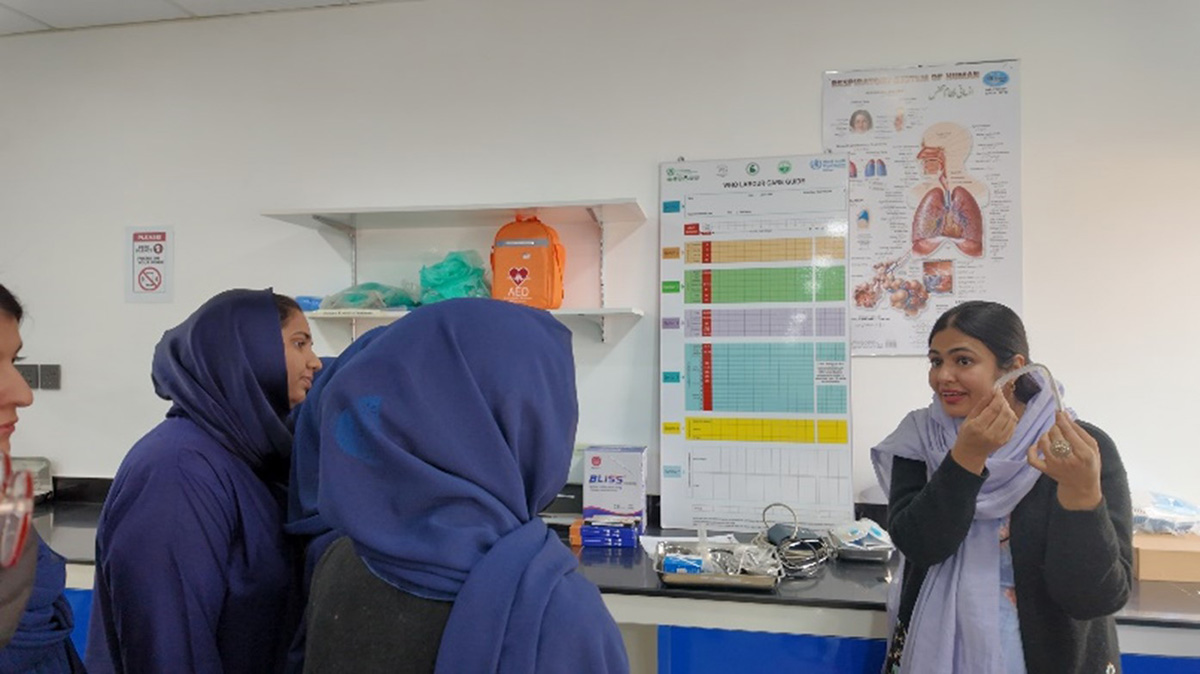 Saima giving a labour care demonstration to midwifery students at the Health Services Academy, Islamabad. Photo credit: Sara Akmal/WHO Pakistan 2 April 2025, Islamabad, Pakistan – “By integrating insights from the WHO Labour Care Guide into my teaching, I aim to empower midwifery students to make informed decisions that will positively impact the lives of women and families across Pakistan. This is vital in reducing maternal mortality rates,” says Saima. She is one of the health care providers and teachers trained by the World Health Organization (WHO), in partnership with the Government of Pakistan, as part of a two-year project to improve health care for millions of Afghan refugees and Pakistanis living in hosting communities in Islamabad and the provinces of Khyber Pakhtunkhwa (KP) and Balochistan.
Saima giving a labour care demonstration to midwifery students at the Health Services Academy, Islamabad. Photo credit: Sara Akmal/WHO Pakistan 2 April 2025, Islamabad, Pakistan – “By integrating insights from the WHO Labour Care Guide into my teaching, I aim to empower midwifery students to make informed decisions that will positively impact the lives of women and families across Pakistan. This is vital in reducing maternal mortality rates,” says Saima. She is one of the health care providers and teachers trained by the World Health Organization (WHO), in partnership with the Government of Pakistan, as part of a two-year project to improve health care for millions of Afghan refugees and Pakistanis living in hosting communities in Islamabad and the provinces of Khyber Pakhtunkhwa (KP) and Balochistan.
Implemented throughout 2023 and 2024 with support from the Government of Canada, the initiative followed a holistic approach to reinforce health services for mothers and newborns, infection prevention and control, disease surveillance, and assistance to survivors of gender-based violence (GBV).
The project has supported millions of individuals across 57 districts. The infection prevention and control component has benefited 16.9 million people; 7.6 million people have benefited from enhanced reproductive, maternal, newborn, child and adolescent health services; and 3 million are estimated to have benefited from improved disease surveillance.
Over 800 health care providers and community mobilizers were trained in 3 provinces, strengthening their capacity to deliver quality health care services. In addition, 3 key government facilities – one each in KP, Balochistan and Islamabad – were renovated and provided with equipment, while 22 district health offices in Balochistan were equipped for effective disease surveillance.
Improving services for mothers and newborns
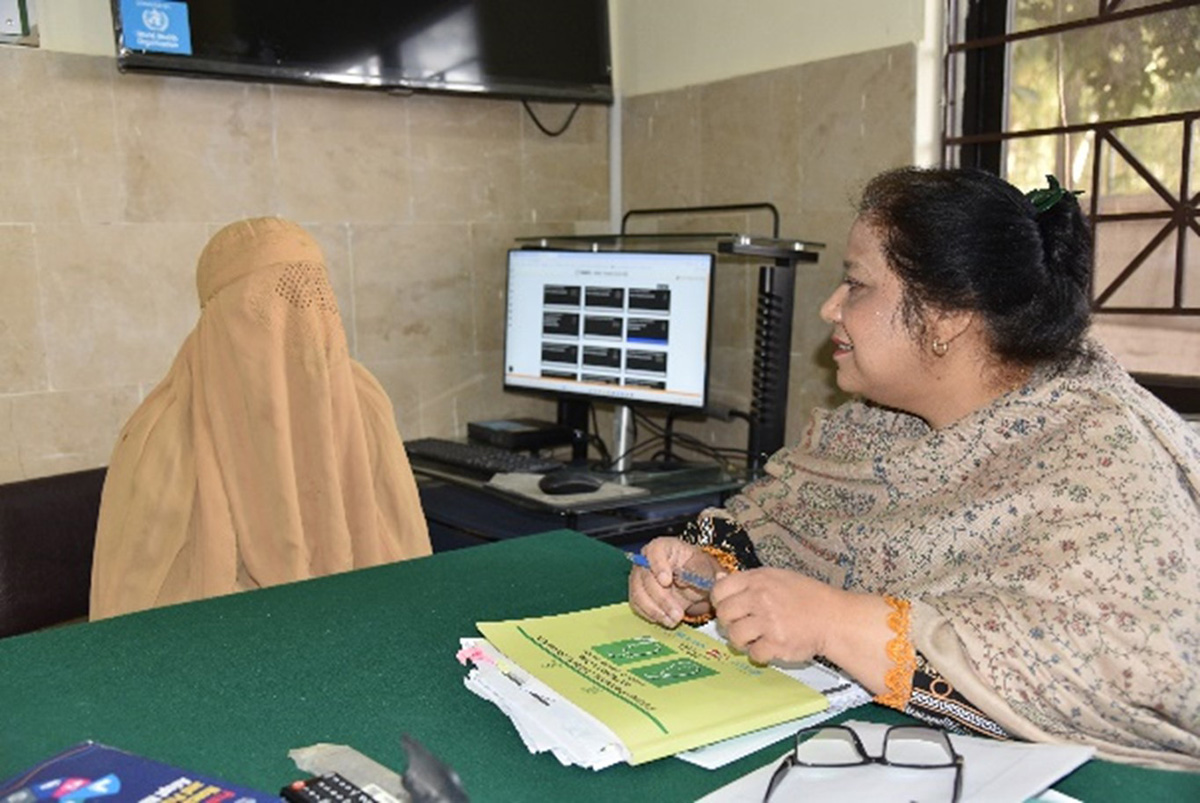 Dr Naz examining patients at the Rural Health Centre, Tarlai, in Islamabad. Photo credit: Sara Akmal/WHO Pakistan“I left the training with key messages which I quickly adapted to share with my students in the Bachelor of Science Midwifery programme at the Health Services Academy,” says Saima. “The majority of these future midwives are from rural areas of Balochistan, KP and Gilgit-Baltistan. These regions face unique challenges, and our future health care professionals must be equipped with the knowledge and skills to navigate these challenges effectively,”
Dr Naz examining patients at the Rural Health Centre, Tarlai, in Islamabad. Photo credit: Sara Akmal/WHO Pakistan“I left the training with key messages which I quickly adapted to share with my students in the Bachelor of Science Midwifery programme at the Health Services Academy,” says Saima. “The majority of these future midwives are from rural areas of Balochistan, KP and Gilgit-Baltistan. These regions face unique challenges, and our future health care professionals must be equipped with the knowledge and skills to navigate these challenges effectively,”
During the labour care training, Saima engaged in hands-on case studies featuring real-world scenarios, equipping her with skills that she can pass on to her students.
The comprehensive labour care training programme, which aims to facilitate timely identification and management of potential complications that may arise during childbirth, was attended by 128 health practitioners.
WHO also organized a series of trainings focused on pregnancy, childbirth and postpartum and newborn care (PCPNC) for 166 health care providers working in KP, Balochistan and Islamabad. One of the participants, Dr Saadia Naz, a senior medical officer at the Rural Health Centre in Tarlai, Islamabad, underlined how the initiative has improved recognition of the importance of antenatal care visits and monitoring: “By diligently implementing protocols in the PCPNC guidelines, health care providers can identify risk factors early, such as anaemia, which is crucial in reducing mortality rates among mothers and infants.”
“As a maternal and child health care hub, we welcome a diverse range of visitors, including Afghan refugees who make up to 30% of our daily footfall. We strive to ensure that every woman receives the care she deserves and that every delivery is a safe experience,” says Dr Naz.
A total of 126 health care practitioners attended training in maternal and perinatal death surveillance and response (MPDSR) organized by WHO Pakistan, and support was extended to upgrade services at the District Headquarter Hospital (DHQ), Haripur, including its Neonatal Intensive Care Unit and Kangaroo Mother Care centre. This hospital serves around 1.1 million people, including 100 000 Afghan refugees.
Reinforcing surveillance: the power of prevention and preparation
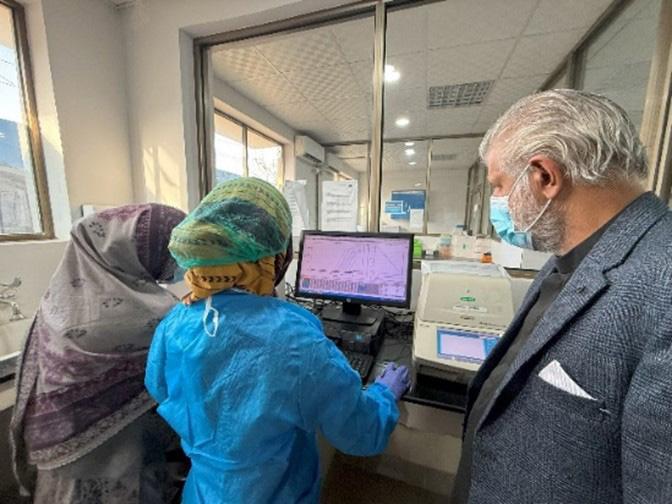 Diagnostics tests being performed at Quetta Public Health Laboratory, Balochistan, under the supervision of Dr Bugti. Photo credit: WHO PakistanIn Balochistan, WHO supported the solarization of the Provincial Public Health Laboratory in Quetta. Its director, Dr Raheem Butgi, explained how the initiative has improved essential services for over 180 000 patients a year by ending frequent power outages that used to disrupt tests and cause the wastage of medical kits used to diagnose over 15 diseases, including hepatitis A and B, HIV and respiratory illnesses.
Diagnostics tests being performed at Quetta Public Health Laboratory, Balochistan, under the supervision of Dr Bugti. Photo credit: WHO PakistanIn Balochistan, WHO supported the solarization of the Provincial Public Health Laboratory in Quetta. Its director, Dr Raheem Butgi, explained how the initiative has improved essential services for over 180 000 patients a year by ending frequent power outages that used to disrupt tests and cause the wastage of medical kits used to diagnose over 15 diseases, including hepatitis A and B, HIV and respiratory illnesses.
“With only 90 cases processed per day, the lab struggled to meet the health care needs of the population. Diagnostics and screenings were hindered, leaving many without the essential care they required. However, the solarization project has completely revitalized the facility. Now, the lab operates with a remarkable success rate of 70–80%, allowing over 500 individuals to access critical health services daily.”
WHO also provided technical support to implement integrated disease surveillance and response (IDSR) at the primary health care level in 35 priority districts in Khyber Pakhtunkhwa and Balochistan. These efforts were spearheaded by dedicated professionals like Dr Mudasir Abro, a field epidemiologist at the Provincial Health Department, Balochistan. “For the first time, health officials can predict and declare outbreaks with greater accuracy, thanks to the proactive measures introduced by IDSR. It is a game-changer for public health in Balochistan. With IDSR, we are not only responding to outbreaks but also preventing them before they escalate,” says Dr Abro.
The impact of IDSR is particularly vital in areas with a substantial presence of Afghan refugees, including districts such as Chaman, Qila Saifullah, Qila Abdullah, Zhob and Quetta which combine dense populations with challenging living conditions and where timely cross-border disease monitoring is essential to save lives.
Water filtration plants for Afghan refugees to prevent deadly diseases
In the face of an imminent public health threat for both Afghan refugees and host communities in Islamabad Capital Territory (ICT), WHO installed water filtration plants to prevent the spread of deadly diseases like polio, acute watery diarrhea, hepatitis, and typhoid. The intervention targeted the high-risk union councils of Sare-e-Kharboza, Sangjani, and Pind Bakhwal, providing safe potable water to particularly vulnerable communities.
Fighting infection, saving lives
 Infectious waste incinerator at Bacha Khan Medical Complex, Swabi. Photo credit: WHO Pakistan “WHO-supported capacity-building sessions led me to embark on a mission to improve infection prevention and control (IPC) protocols within this complex. Dr Amjad Mehboob, Professor of Medicine and Head of the Department of Infectious Diseases at the Complex in Swabi, explained that WHO’s comprehensive IPC document has transformed theoretical knowledge into actionable practices. “One of the most significant areas of improvement has been waste management. Prioritized waste segregation practices have led to a remarkable reduction in overall waste volume of up to 90%.”
Infectious waste incinerator at Bacha Khan Medical Complex, Swabi. Photo credit: WHO Pakistan “WHO-supported capacity-building sessions led me to embark on a mission to improve infection prevention and control (IPC) protocols within this complex. Dr Amjad Mehboob, Professor of Medicine and Head of the Department of Infectious Diseases at the Complex in Swabi, explained that WHO’s comprehensive IPC document has transformed theoretical knowledge into actionable practices. “One of the most significant areas of improvement has been waste management. Prioritized waste segregation practices have led to a remarkable reduction in overall waste volume of up to 90%.”
Dr Amjad was one of the senior experts involved in training 300 health care workers on standardized infection prevention and control, training which has benefited a population of 16.9 million via health workers who cater daily to the needs of refugees and host communities.
With 95% of IPC certification and patient safety protocols covered, Bacha Khan Medical Complex serves as a model for other centres in Pakistan. The hospital treats 1400 to 2000 patients daily, including 150 to 200 Afghan refugees.
Gender-based violence survivors rebuild their lives
“Here, nearly 99% of the women who seek help are battling anemia and communicable diseases, and most often have no clue about it.” Dr Rukhsana Naheed, medical practitioner and psychologist at the Family Protection and Rehabilitation Centre for Women (FPRCW) in Islamabad. The Centre is a safe space for survivors of GBV seeking help, primarily women and children from Afghan refugee settlements and hosting communities in Islamabad Capital Territory.
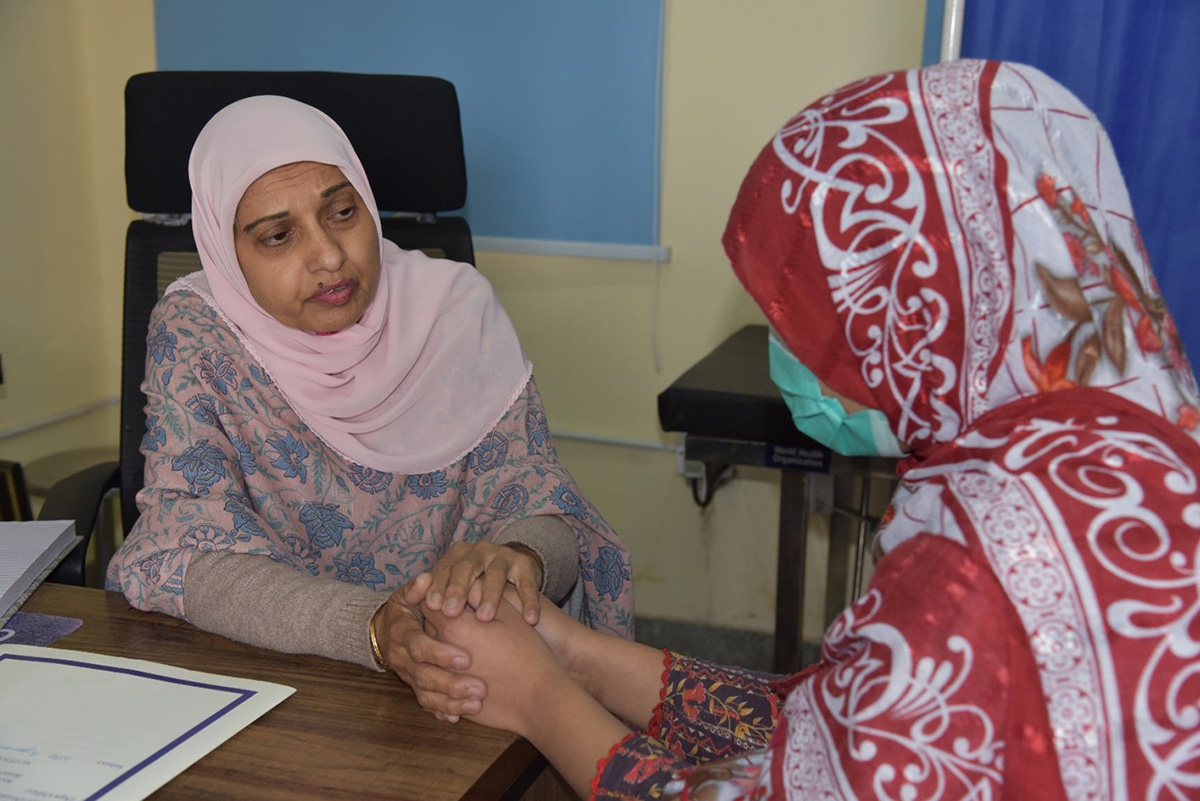 Dr Rukhsana during a consultation with a gender-based violence survivor at FPRCW. Photo credit: Sara Akmal/WHO PakistanDr Rukhsana is one of the experts trained by WHO, in collaboration with the Ministry of National Health Services, Regulations and Coordination and the Ministry of Human Rights.
Dr Rukhsana during a consultation with a gender-based violence survivor at FPRCW. Photo credit: Sara Akmal/WHO PakistanDr Rukhsana is one of the experts trained by WHO, in collaboration with the Ministry of National Health Services, Regulations and Coordination and the Ministry of Human Rights.
With financial support from the Government of Canada, WHO provided technical and operational assistance to the Centre, including capacity strengthening and the enhancement of facilities. The improvements integrated a clinic for GBV-related integrated health care and psychosocial support services with a telemedicine facility. Since the completion of the refurbishment in May 2024, around 130 survivors have received health care services, including vital mental health and comprehensive psychosocial support. The telemedicine facility at the clinic, which is connected to the WHO-supported GBV Clinical Hub at the Pakistan Institute of Medical Sciences, allows survivors to access safe, basic, and advanced health care and counselling within the premises of the center.
“We deal with high-risk GBV cases, survivors who face such significant threats that they cannot even move freely outside. Over the last 8 months, this telemedicine clinic has bridged critical counselling gaps, providing essential mental and emotional support services to 28 GBV victims in a safe, secure environment, building their trust in us,” says Dr Rukhsana.
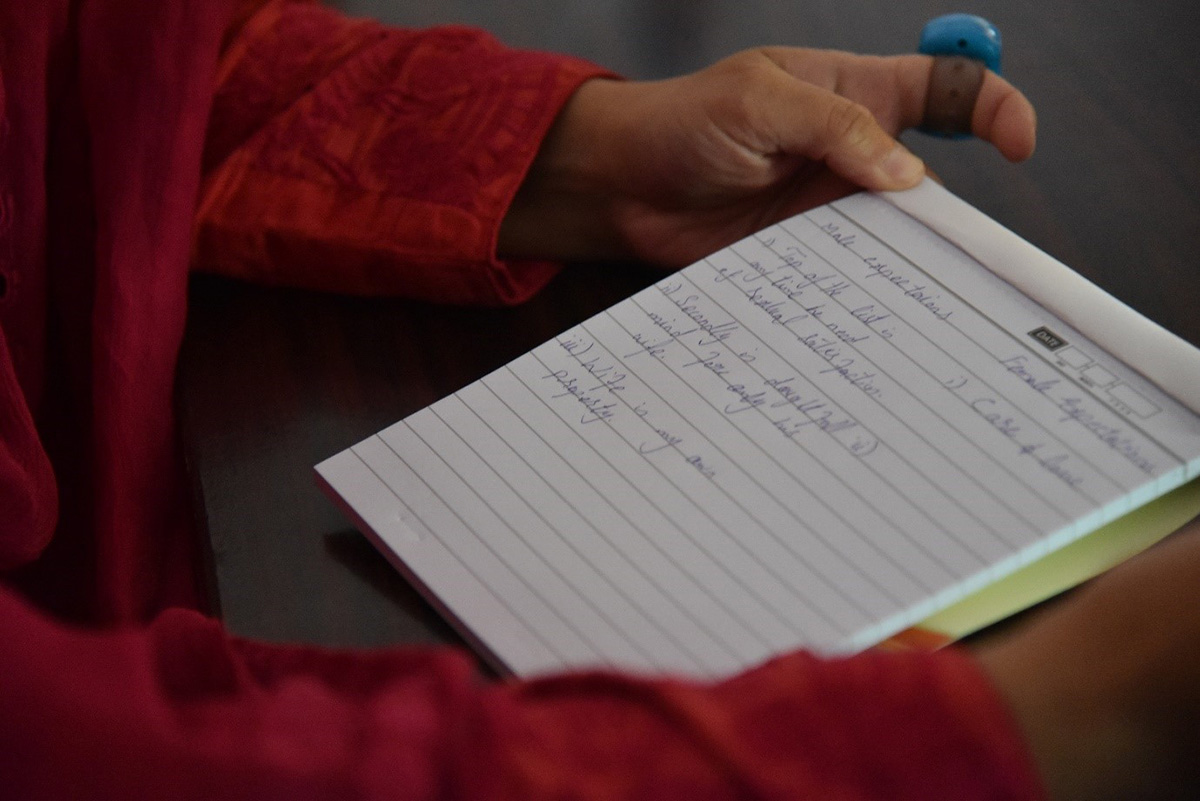 Training session for survivors on the health impacts of gender-based violence and accessing available services. Photo credit: Sara Akmal/WHO Pakistan WHO provided capacity-building to 30 service providers associated with the centre, including clinicians, psychologists and case managers, 80% of whom were women. Guided by national health protocols for victims of GBV, participants learned to leverage technology to provide the best possible health care and psychological support to survivors. WHO also trained 26 first line responders, including female community support/welfare workers and social mobilizers, in providing community-based psychosocial support to survivors in Islamabad Capital Territory.
Training session for survivors on the health impacts of gender-based violence and accessing available services. Photo credit: Sara Akmal/WHO Pakistan WHO provided capacity-building to 30 service providers associated with the centre, including clinicians, psychologists and case managers, 80% of whom were women. Guided by national health protocols for victims of GBV, participants learned to leverage technology to provide the best possible health care and psychological support to survivors. WHO also trained 26 first line responders, including female community support/welfare workers and social mobilizers, in providing community-based psychosocial support to survivors in Islamabad Capital Territory.
"The enhanced skills in case management, service delivery and screening are now a cornerstone of our approach while dealing with GBV victims,” reports Saira Furqan, FPRCW manager.
GBV survivor Bushra explained how the support she received helped her overcome crisis “and find the courage to speak up” for herself.
Laila, another survivor, said the services she received at the Centre provided her with vital support, helping her to take necessary action. “I found the courage to rise above my confinement and share my ordeal.”
Laila and Bushra’s testimonials are a reminder of how integrated health care services can help GBV survivors to rebuild their lives.


